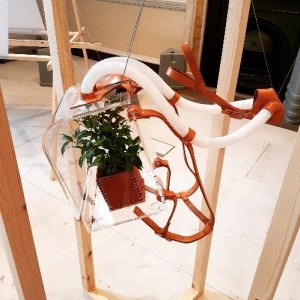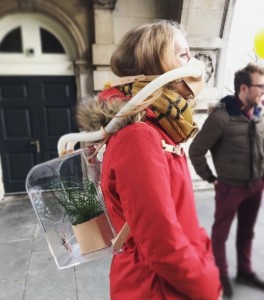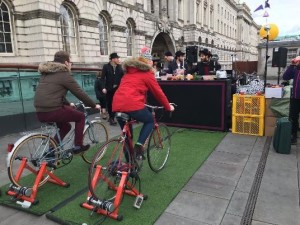Last weekend, visitors to Somerset House could enjoy a series of interactive installations around the topic of air pollution. Pollution in London regularly exceeds legal limits, often due to the heavy traffic. The Space to Breathe exhibition aimed to raise awareness of this important issue by making it accessible to people.
 The exhibition was curated by Cape Farewell and Shrinking Space, in partnership with the Environmental Research Group (ERG) here at King’s College London. The ERG also run the LondonAir website, giving Londoners up-to-date information about the air we are breathing on a daily basis.
The exhibition was curated by Cape Farewell and Shrinking Space, in partnership with the Environmental Research Group (ERG) here at King’s College London. The ERG also run the LondonAir website, giving Londoners up-to-date information about the air we are breathing on a daily basis.

Wearing the “Voyage on the Planet” backpack
One of the most striking pieces of the exhibition was Chih Chiu’s “Voyage on the Planet”: a glass backpack with a plant inside, connected to a facemask to block out surrounding pollution. Visitors were encouraged to try it out themselves, and to take it outside to the streets of London. Cape Farewell and Shrinking Space posted photos of this throughout the weekend. I also got the chance to try one of the backpacks, which did make me think about what I breathe in every day – even when just crossing Waterloo Bridge!
By using VR headsets, the exhibition also offered to experience what the Aldwych could look like in a greener future: think lorries and cars replaced by pedestrians and green space. Artist Caroline Wright asked people to sing a single note to see how where they live affects their lung volume, and to collate the voices of visitors in a single Sounding Scape. On the Terrace, Solar Sound System ran a bar powered on solar energy and bicycles: two people cycle to keep the music on, while to more cycle to get the juice presses working.
Air pollution is something that is largely invisible, especially when it comes to NO₂. Throughout the weekend, the artists and experts at Space to Breathe made it visible through the different installations. Photos of the whole weekend can be found by visiting Cape Farewell, Shrinking Space, Cultural King’s and LondonAir.




 and qualitative measures developed at the GCSO institutions. This way, universities can ensure that operations and users of buildings do not experience any negative impacts as a result of the “experiment”.
and qualitative measures developed at the GCSO institutions. This way, universities can ensure that operations and users of buildings do not experience any negative impacts as a result of the “experiment”.
